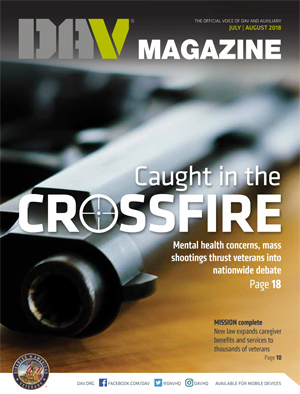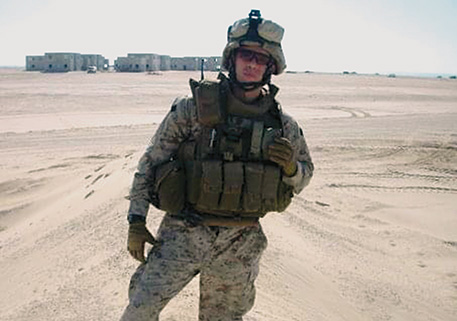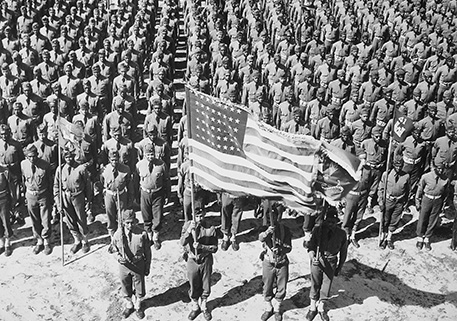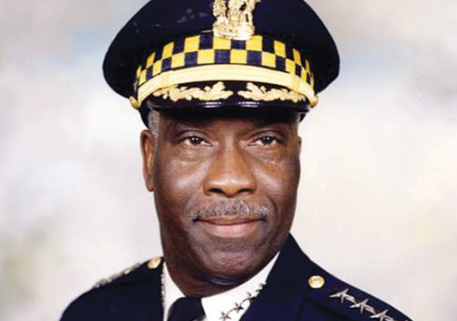 Shooting at California veteran treatment facility thrusts veterans into gun-control debate
Shooting at California veteran treatment facility thrusts veterans into gun-control debate
The issue surrounding veterans being treated for mental health illnesses and their access to firearms was once again thrust into the national spotlight when Albert Wong, a former soldier who deployed to Afghanistan in 2013, entered a California veterans treatment facility and killed three people before taking his own life.
National Commander Delphine Metcalf-Foster, who frequently volunteered at the facility, said the country has forever lost three professionals who dedicated their lives to serving veterans.
“My heart was very heavy when I learned of the tragedy at the Veterans Home of California,” she said. “The loss of Dr. Jennifer Golick, Dr. Jennifer Gonzales Shushereba and Executive Director Christine Loeber continues to be felt by DAV and the veteran community. Our thoughts and prayers are with their families as we mourn with them.”
“The gun control debate is certainly part of the national conversation, even if it is an issue that goes beyond DAV’s congressionally chartered purpose,” said DAV National Adjutant Marc Burgess. “And questions regarding mental health and veterans have inserted us into a nationwide topic that harbors strong feelings on both sides of the equation.”
Wong was being treated at the facility in a program called the Pathway Home, a nonprofit organization whose stated goal is to “help post-9/11 veterans transition from military service to success.” According to reports from CBS, SFGATE and The Press Democrat, Wong was being treated for issues related to post-traumatic stress disorder but was dismissed from the program because he was violent.
The incident is still under investigation by law enforcement. But veterans—in particular those who have encountered traumatic experiences in service—offer a unique perspective on the gun control debate.
“It’s a complicated relationship,” said Dr. Casey Taft, principal investigator, National Center for PTSD, VA Boston Healthcare System. “I don’t know that anyone can definitively say why PTSD is correlated with violence, though we have some ideas about this based on research.”
Taft said most people with PTSD are not violent, but veterans who have experienced trauma may be at a higher risk to act violently.
“There are various populations exposed to constant trauma, which places them at higher risk for problems with anger and violence, similar as with veterans,” Taft said. “There isn’t great data for rates of violence in recent veterans. The last good data sets come from the Vietnam era.”
Tyrone Lampkin, Wong’s older adopted brother, told CBS that Wong was angry at the Pathway Home staff after being kicked out of the program. That mentally ill veterans might pose a safety risk to their fellow veterans and other service providers makes the subject hit even closer to home for DAV advocates and volunteers who are helping veterans through difficult times.
Veteran gun owners and the law
Title 18 U.S.C. §§ 922(d) governs who, under federal firearms laws, is prohibited from possessing firearms, which includes felons, fugitives, persons addicted to controlled substances, undocumented immigrants, people dishonorably discharged from the armed forces, persons who have renounced their U.S. citizenship, subjects of a qualifying domestic protection order, persons convicted of domestic violence, and persons who have been adjudicated by a court of law as mentally defective or who have been involuntarily committed to a mental institution.
John I. Harris is a practicing attorney with more than three decades of judicial experience. He also volunteers as the executive director of the Tennessee Firearm Association.
“Basically, what [the law] says is that when someone is adjudicated as mentally incompetent, your gun owner rights can be taken away,” Harris said. “But the problem is, in some cases, obtaining Social Security or disability benefits for mental health issues can also take your rights away.”
The VA says that doesn’t happen.
“Patients are neither flagged for these or other mental health diagnoses, nor does a patient record flag directly affect the ability to purchase firearms,” said Curt Cashour, VA press secretary.
But, according to a 2017 study by the Congressional Research Service, it does occur and has already happened to nearly 200,000 veterans.
In 1998, the Bureau of Alcohol, Tobacco and Firearms adopted a new procedure that defined “mental defective” to include someone who “lacks the mental capacity to contract or manage their own affairs due to injury or disease.”
For veterans, this means that if the VA decides a veteran is mentally incompetent and appoints a fiduciary, a prohibiting record is created and sent to the FBI. The FBI enters the veteran’s record in the National Instant Criminal Background Check System, which contains names of people who are flagged and their access to firearms restricted.
As of the start of 2017, federal agencies had contributed 171,083 records to the system’s index under the new provision enacted by the ATF.
The VA contributed 98.1 percent of those, or 167,815.
Cashour said the congressional study was not a VA study, and he could not vouch for it, and the Veterans Benefits Administration can declare someone mentally defective and thus have the person’s access to firearms restricted.
“Per federal law, the VA reports a veteran to the National Instant Criminal Background Check System if he or she is adjudicated as incompetent by the Veterans Benefits Administration for purposes of managing his or her monetary benefits,” he said.
The Legal Information Institute at Cornell Law School defines “adjudication” as a “judicial ruling or decision” and “judicial proceeding.” The legal dictionary defines it as “the formal giving or pronouncing of a judgment or decree in a court proceeding.”
According to Harris, this means the VA can arbitrarily ban a veteran from possessing a firearm without being adjudicated by a court as specified by federal law.
“One of the problems I have seen is that there are veterans who feel they have to make a choice in pursuit of their earned benefits as to whether to seek, or accept, an award of benefits for psychiatric conditions at the risk of having their ability to hunt or defend themselves and have their firearms taken away from them,” said Harris.
Harris said it’s technically possible for veterans who have been determined by the VA as incompetent to fight back, but in reality, it’s a battle most people do not have the resources to win.
“The problem for many people is that these cases are very expensive to prosecute. If a private citizen wanted to keep pursuing a case, they must realize that they will be litigating against agencies and attorneys funded with taxpayer dollars,” said Harris. “The individual could anticipate legal expenses, unless assisted by third-party funding, which would easily range to $100,000 or more.”
According to Metcalf-Foster, the thought that veterans would avoid seeking treatment out of concerns about their guns being taken away is a major concern.
“No veteran should ever go without health care or avoid calling the crisis line because he or she is concerned the government will take their property if they do so,” she said. “It doesn’t work that way. As a patient, you have legally protected confidentiality with your care provider. Unless you threaten violence to yourself or others, no legal action is going to be taken for those seeking assistance.”
So who, if anyone, should be allowed to decide if a veteran’s access to firearms is restricted?
“My personal opinion, as a private citizen, is that the only authority to take a veteran’s access away is a court of law, based on the same requirements for the court to determine if you are mentally fit to take care of yourself,” said Danny Oliver, a retired Marine and law enforcement officer who serves as adjutant for the DAV Department of Oklahoma. “And I mean a state or federal court—not the VA, who already has the ability to require a fiduciary without adjudication by a court of law.
“And they don’t always get that right either,” said Oliver.
“Everyone wants and deserves to feel safe—particularly those who served. Sadly, there may be veterans whose injuries, trauma or mental health make their possession of firearms a public safety risk,” Metcalf-Foster said. “There are no easy answers, and opinions on nearly every aspect of these issues are as strong and personal as they are varied. All the while, we are facing an epidemic of veterans committing suicide, and we know that our familiarity and proficiency with firearms make desperate veterans more successful at ending their lives.”
Why did the VA ask if I owned a gun?
“The VA has asked me, and they’ve asked my wife, if we have any firearms in the house,” said Jason Pepper, a blind Iraq War veteran and life member. “I tell them ‘no’ because it’s none of their business.”
The VA says the question is a suicide prevention tool.
“Access to lethal means, such as medications or firearms, is a major risk factor for suicide,” Cashour said. “Veterans may be asked by their health care providers, as part of risk assessment or safety planning, about access to lethal means in their homes.”
“I’d think that’s a viable question for the VA to ask,” Pepper said. “There are some veterans out there who shouldn’t have firearms, but the overwhelming majority of veterans are some of the most responsible gun owners in the country. I think it’s a gray area for the veteran, and we have to tread lightly.”
John Plahovinsak, also a life member, said he had no problem with a screening question related to gun ownership.
“I would answer it, primarily because the medical professional is there to help me, and if he needed that information, I’d reply to it,” said Plahovinsak. “I imagine if someone is being treated for mental health illness, the VA physician should be made aware of that, and they should be able to make a determination about the risk factor involving the veteran who is being screened.”
Another suicide prevention tool offered by the VA is free gun locks.
“VA suicide prevention coordinators frequently distribute gun locks at VA facilities and community outreach events,” said Cashour, directing veterans or family members to the Veterans Crisis Line website’s resource locator, where locks can be obtained.
Dr. David Carroll, executive director of the VA Office of Mental Health and Suicide Prevention, said in an email that the VA does not collect personal information on gun owners when distributing the locks.
If I am being treated for PTSD will I lose my guns?
“We would only need to break [doctor-patient] confidentiality if someone reported harm toward a child or elderly person, or reported a direct threat to themselves or another,” said Taft. “Fortunately, I have not had to make that decision and report anyone from the groups I’ve run.”
Harris said current firearm laws don’t make things easy for veterans who are gun owners and need help for mental illness.
“One of the problems I see is that lawmakers often view mental health as binary and don’t look beyond the binary,” said Harris. “In mental health, if you have a situation, it’s almost a lifelong sentence, even if you struggle back and overcome it. I think that’s a failure of our legal system. Once you’ve been diagnosed once, lawmakers may not care if you get treatment and have been OK for five years.”
DAV life member and Distinguished Service Cross recipient Stephen Sanford said the VA has asked him if he was a gun owner, and he had no problem telling them he was.
“I think it should be asked in the proper context,” the retired Army veteran said. “My family doctor knows me very well. If he thought I had a significant mental health issue or thought I was suicidal, then I’d feel comfortable discussing guns. At the VA, you don’t always work with the same provider, and when the VA asks, it’s like the federal government is asking. It’s an issue of trust and relationship. And relationships matter.”
He was also asked by a provider in a private hospital, but he wasn’t the one being treated.
“When my wife and I had our daughter last year, we had to take her to the children’s hospital,” Sanford said. “While we were doing the intake paperwork they had a social worker come out and start asking us all these questions and included whether I owned a gun. I was pretty furious. I was there checking my prematurely born daughter in for heart surgery, and they wanted to know if I owned a firearm.”
“I think people should understand that violence isn’t necessarily a consequence of PTSD,” said Taft. “Risk for violence is increased with PTSD, but most of those with PTSD are not violent. The notion that one can’t recover from PTSD and function at a high level has been shown to be false.”
“What we’re seeing at the federal level is courts are finding that a statutory prohibition as a result of mental health is, in some instances and under certain facts, too harsh,” Harris said. “As an ‘as applied’ constitutional challenge, which means applied to a specific set of facts, a court could say that a denial of access to guns, or a prosecution, based on a mental health history is unconstitutionally harsh.”
“Regardless of where veterans stand on gun control, one thing that’s certain is the issue has cast a spotlight on our community,” Metcalf-Foster said. “I think it’s safe to say there needs to be more discussion on the topic. We who have been changed in service are often more skeptical about government. Having seen the impact of violence at a place where I’ve spent so much time as a volunteer, my greatest hope is that veterans will not allow their concerns to impede access to the care and benefits they’ve earned.
“It takes a special courage to seek help, and getting care can eliminate the risk of a crisis.”






